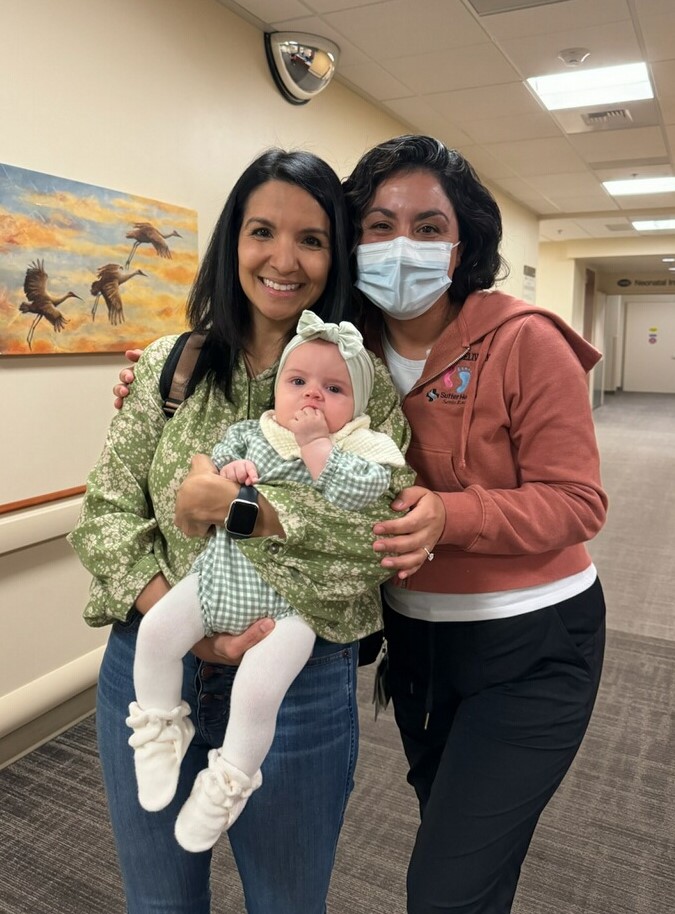SACRAMENTO, Calif. – Every young person’s response to a traumatic event like a pandemic is unique and varied, but one thing is certain—it’s stressful. For many children and teens, stress commonly takes shape in the form of resistance, grief or even loss. These are intense emotions for developing minds, so it’s critical they don’t go unchecked.
“As parents, we set the stage for how our kids learn to navigate experiences,” says Anna Morgado, a licensed marriage and family therapist at Sutter Health. “They model behaviors based on what they see, so it’s important we provide support and create channels for safe and open dialogue.”

Morgado continues, “One of the hallmarks of a crisis is that people may feel stuck and like it will go on forever. Talking about ‘when this is all over, we will do…’ provides comfort and a sense of control.”
Here are ways to talk with your kids about COVID-19:
Information provided by Sutter’s Children’s Bereavement Art Group.
• Talking to children about COVID-19 is similar to talking to children about grief. Parents and caregivers should use concrete, simple and developmentally appropriate language to explain concepts.
• Follow your child’s lead. Allow them to ask questions and see where the conversation goes. When talking to teens, you might say, “Are your friends talking about coronavirus? What are they saying?” For younger children, you might say, “Have you heard grownups talking about a new sickness that’s been going around? What have you heard?”
• Talk openly and honestly to children about what’s happening.
• Mention the symptoms of the virus are similar to a flu (cough, fever, shortness of breath). Most people who get the virus have mild symptoms.
• Explain that the virus isn’t very common in children.
• Let them know if someone feels very ill, they can go to the hospital.
• Empower your child by letting them know they can help by practicing good hand washing, not touching their face and sneezing into their elbow.
• Let them know this time of quarantine and social distancing will pass—it’s temporary.
• Explain social distancing as, “We need to stay at least six feet away from people in public and wear masks so that we protect ourselves and others.”
• Tell them that a pandemic can be explained as, “People all over the world are sick with this virus.”
Possible behavior changes from your child
It’s okay that things aren’t normal right now. However, we need to be vigilant when our kid’s behavior is off. Here are changes to look for:
• Excessive crying or irritation in younger children.
• Returning to behaviors they have outgrown (e.g., toileting accidents or bed wetting).
• Excessive worry or sadness.
• Unhealthy eating or sleeping habits.
• Irritability and “acting out” behaviors in teens.
• Poor academic performance or avoiding schoolwork during the school year.
• Difficulty with attention and concentration.
• Avoidance of activities enjoyed in the past.
• Unexplained headaches or body pain.
• Use of alcohol, tobacco or other drugs.
How to support your child

Supporting your child doesn’t have to be a huge lift. Here are activities that will go a long way in bringing normalcy and consistency to their day:
• Provide structure and a daily routine. Work together to establish a daily plan that includes mealtimes, bedtime, work time, playtime, creative time and exercise. Set small goals every day. Do your best to attend to your child and your own body, brain and emotions.
• Share your feelings while also providing reassurance. Let your child know caregivers are there to keep them safe. Helpful statements include: “There are lots of amazing grown-ups, such as doctors and nurses, working hard to keep us healthy” and “We’ll get through this together.”
• Model good self-care. Take breaks, get plenty of sleep, exercise, eat well and stay connected to your friends and family members.
• Encourage expression. Let your children express themselves through art, writing, talking things out and physical activity.
• Use touch. Take advantage of extra time during the quarantine for cuddles, hugs and play. Physical closeness and care go a long way in helping children feel safe and loved.
Reaching out for help
“These are extraordinary times, so if your child’s in a temporary funk for a day or two that isn’t overly concerning. However, if this prolonged state doesn’t budge, then it may be time to enlist a third party,” says Morgado.
Whether by phone, video chat or in-person, talk to your primary care provider about options. “It’s important to meet children where they are. Our therapists are incredibly skilled at helping kids understand, build resiliency skills and move forward,” says Morgado.
The National Parent Helpline is at 1-855-4A-Parent (1-855-427-2736).
The Sacramento Regional Family Justice Center’s 24-hour Parent Support Line is 1-888-281-3000.




